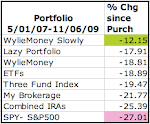Here is a breakdown of the amounts for three, five and ten funds:
- For three funds $7500 initial, $300 per month.
- For five funds $12,500 initial, $500 per month
- For ten funds $25,000 initial, $1000 per month
So I am going to start a collection of ideas to reduce the cost of living, making it possible to save and invest. Please post any ideas you have as a comment to this post and I will add them to the list as well. You can also email your ideas to me at wyliemoney at gmail dot com.
- The first suggestion comes from Dave over at east3rd.com. Dave recommends bicycling to work in general and saving money is not his primary motivation- but any time you find a way to save $70 per month, it is an idea worth sharing.
- Sean suggests paying yourself first by directing a small portion of your paycheck straight to a savings account.
- David mentions buying generic products at the grocery store. I would add that you should not get hung up on only buying generic products. If there are one or two things you really think taste better, buy the brand you like and treat yourself.
- Holly suggests that you make your own coffee. This can easily save you $100 a month if you buy coffee out every morning. I like Holly's approach too- do not 'cut out' going to Starbuck's or Dunkin Donuts if you enjoy their sugary treats. Do not go every day and when you do go, you'll enjoy the treat even more.



2 comments:
A trick I was taught is to pay yourself first. These investments are for you and your future and not to be considered another expense along with rent/mortgage, car payments, insurance, etc.
So, what you can do is direct deposit a piece of your paycheck into a separate account, and then use that account to either save for the initial investment, as you point out, or feed those investment accounts. This way, you never see the money, and, really, once you get used to that $50 or $100 not being in your paycheck from week to week, you don't notice it. And then you can increase it by living further below your means, piping a raise right into it, or some other method.
Something else I used to use when I didn't have a lot of money is sharebuilder.com. The fees add up quickly, but for a would-be investor without a lot of starting capital, I think it can be a good entry into the game.
I often buy generic products at the grocery store, and when my employer didn't pay for my lunches, I always brought a lunch.
Post a Comment